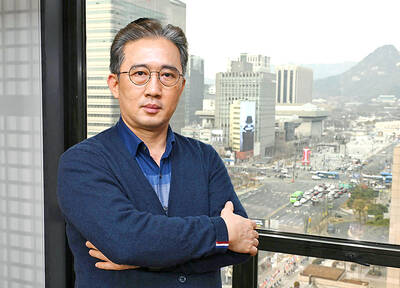China may look to end its state monopoly on farmland sales and take on staggering rural government debts in a drive to rid the countryside of discontent, a leading Chinese adviser said yesterday.
The office director of the Communist Party's "leading group" for rural policy, Chen Xiwen (
But Chen told a news conference that farmers may eventually be allowed to sell land directly, cutting out officials from taking the lion's share of profits from often corrupt land deals -- a problem that has fueled rising rural unrest.
"It's true that the attention of society has been turned toward conflicts arising from the use of farm land for some time now. It's also true that it's currently a factor in bringing about instability in some rural areas," he said.
According to the government's own statistics, more than 200,000 hectares of farmland is turned into factory floors or residential areas every year.
The clashes typically erupt because farmers feel they are not adequately compensated.
"Eventually, we have to propose steadily reforming the land acquisition system itself," he said.
"Here the crux is whether land for development must be all monopolized by the state, so that the state acquires the land and then passes it on to developers."
Any move to lift the current state stranglehold on farmland sales would break with policies the late paramount leader Deng Xiaoping (
Chen said that the government would move carefully on land reform.
"If it went out of control, there would be major losses of China's precious land resources," Chen said.
Chen advises Premier Wen Jiabao (溫家寶) and other top party officials on rural policy, and helped draft China's ambitious plan to build a "new socialist countryside" and narrow the stark gaps in income, health and schooling that have divided urban and rural citizens.
Last year, rural residents earned an average 3,255 yuan (US$400) each in annual income, while urban residents earned an average 10,493 yuan, Chen noted.
Reducing that still widening gap would be a "long process, but the gravity of the problem has attracted serious attention from all sides," he said.
Clearing away mounting rural government debts and directing more government revenues and bank loans to farmers would be "crucial" to the government's plans, he said.
In the late 1990s, those debts reached 360 billion yuan (US$44.7 billion), as local officials rushed to increase staff and build showcase projects, Chen said.
"Financial support for agriculture is crucial, and at present it appears to be clearly insufficient," Chen said.
He added that the government would embark on a nationwide audit of rural government debts and then decide how to deal with them.

VAGUE: The criteria of the amnesty remain unclear, but it would cover political violence from 1999 to today, and those convicted of murder or drug trafficking would not qualify Venezuelan Acting President Delcy Rodriguez on Friday announced an amnesty bill that could lead to the release of hundreds of prisoners, including opposition leaders, journalists and human rights activists detained for political reasons. The measure had long been sought by the US-backed opposition. It is the latest concession Rodriguez has made since taking the reins of the country on Jan. 3 after the brazen seizure of then-Venezuelan president Nicolas Maduro. Rodriguez told a gathering of justices, magistrates, ministers, military brass and other government leaders that the ruling party-controlled Venezuelan National Assembly would take up the bill with urgency. Rodriguez also announced the shutdown

Chinese President Xi Jinping’s (習近平) purge of his most senior general is driven by his effort to both secure “total control” of his military and root out corruption, US Ambassador to China David Perdue said told Bloomberg Television yesterday. The probe into Zhang Youxia (張又俠), Xi’s second-in-command, announced over the weekend, is a “major development,” Perdue said, citing the family connections the vice chair of China’s apex military commission has with Xi. Chinese authorities said Zhang was being investigated for suspected serious discipline and law violations, without disclosing further details. “I take him at his word that there’s a corruption effort under

China executed 11 people linked to Myanmar criminal gangs, including “key members” of telecom scam operations, state media reported yesterday, as Beijing toughens its response to the sprawling, transnational industry. Fraud compounds where scammers lure Internet users into fake romantic relationships and cryptocurrency investments have flourished across Southeast Asia, including in Myanmar. Initially largely targeting Chinese speakers, the criminal groups behind the compounds have expanded operations into multiple languages to steal from victims around the world. Those conducting the scams are sometimes willing con artists, and other times trafficked foreign nationals forced to work. In the past few years, Beijing has stepped up cooperation

The dramatic US operation that deposed Venezuelan president Nicolas Maduro this month might have left North Korean leader Kim Jong-un feeling he was also vulnerable to “decapitation,” a former Pyongyang envoy to Havana said. Lee Il-kyu — who served as Pyongyang’s political counselor in Cuba from 2019 until 2023 — said that Washington’s lightning extraction in Caracas was a worst-case scenario for his former boss. “Kim must have felt that a so-called decapitation operation is actually possible,” said Lee, who now works for a state-backed think tank in Seoul. North Korea’s leadership has long accused Washington of seeking to remove it from power